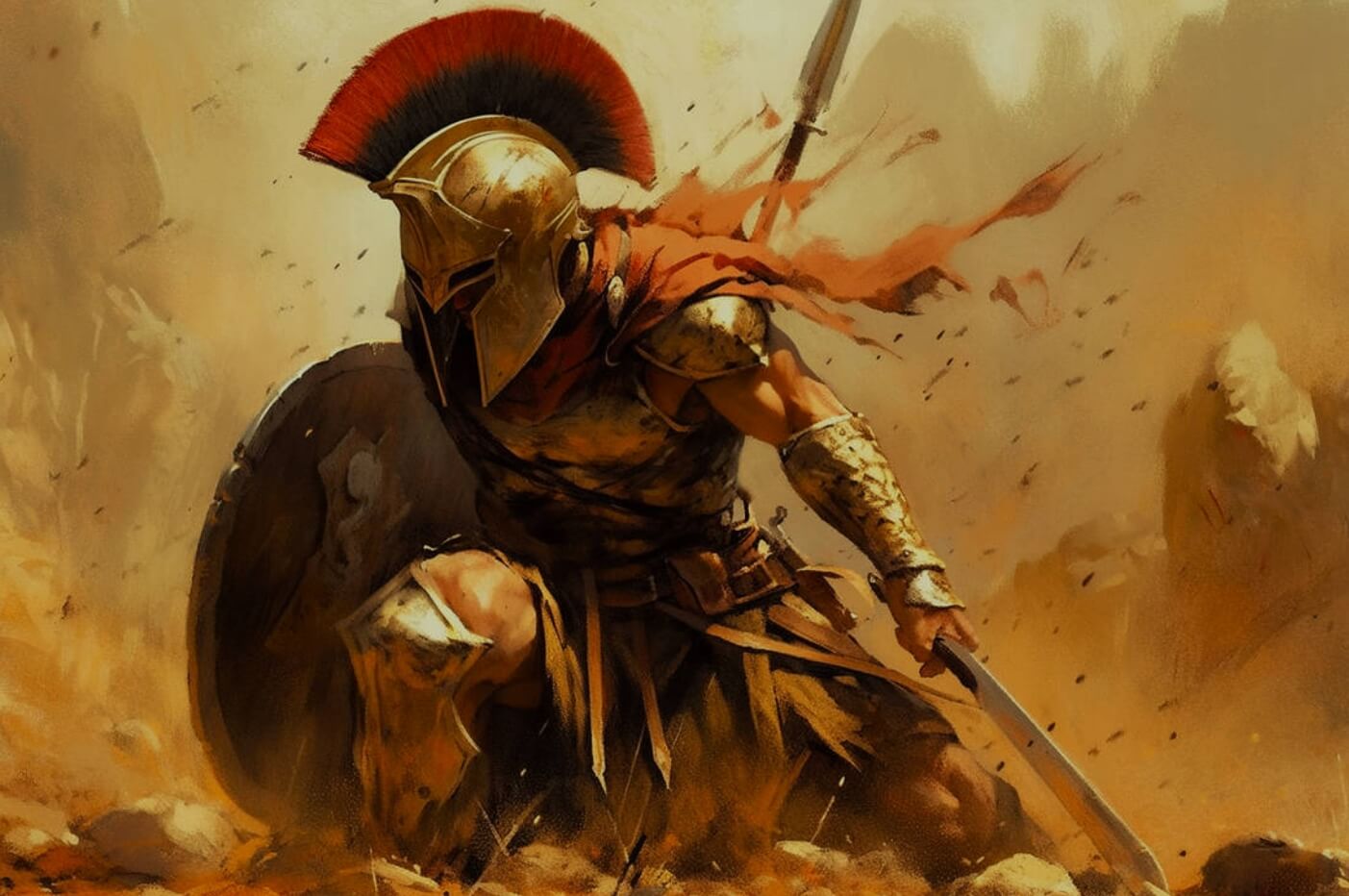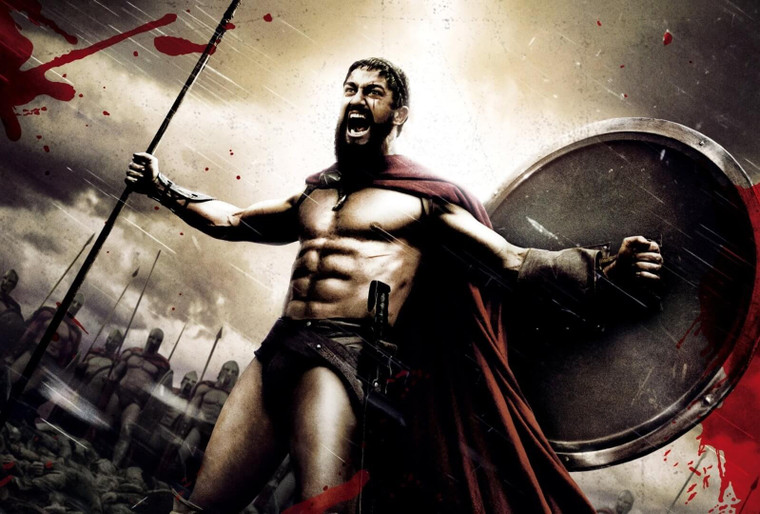Spartan Warriors History & Code
Posted by Warrior Poet Society on Jun 7th 2024
C.S. Lewis described a fallacy of sorts: “chronological snobbery,” which is the assumption that we understand the world and the human condition better than our historical predecessors. The truth is, we likely know less than they did, despite all the information and hubris at our fingertips. We stand on the shoulders of giants. We would do well to remember them. Two of these giants are King Leonidas and the warrior Dienekes—Spartan men of renown. My main source is Stephen Pressfield’s book Gates of Fire: An Epic Novel of the Battle of Thermopylae.
"So why would you base your study of the Spartans on a work of fiction like Gates of Fire?," you might ask. Isn't Stephen Pressfield just that guy who wrote a golfing book about Bagger Vance?" Yes. And the War of Art.
Yes. He did. He understood that producing anything of value requires the endless battle against complacency and all the other forms of resistence that stand in the way of us becoming who we need to be--as artists, as men, as warriors, as protectors.
But Pressfield also knows about the war of war. He's a Duke University graduate who decided to join the U.S. Marine Corps as an infantryman in 1966. As you might recall, that was right in the heat of the Vietnam War.
He's a great writer and historian and a credible source when it comes to understanding the human experience on the battlefield. I really appreciate how he captures the graveyard, dark humor that keep soldiers sane in the midst of terrible circumstances.
And The Battle of Thermopylae was terrible. Up close and personal. The Spartans were attacked by the Persians under the command of Xerxes around 480 B.C. and the odds were just atrocious.
The vast 2 million-man Persian army up against 300 Spartans and some small bands of their allies. Pressfield does a masterful job of capturing the inner mind of a warrior.
Who Was King Leonidas?
Leonidas was a warrior of warriors. He was the ruler of a city state that raised their children from an early age to be fierce in battle. So Leonidas was no less fierce. His title of king did not mean he was exempt from the same pursuit of glory in defense of his country.
Leonidas led the way. He was a warrior poet. He knew history, philosophy, and literature. Which means he knew the culture he was fighting to defend. But he was also an incredible fighter, skilled at violence to protect what he loved. He was a brilliant and disciplined tactician.
He was a student of psychology, and knew how to leverage that knowledge to strengthen his men and overcome his enemies. And of course he knew how to position and time all the elements on the battlefield to gain the advantage.
Who Was the Spartan Warrior Dienekes
Dienekes has been deemed one of the bravest Spartans serving at the time of Leonidas and fighting (and dying) at the Battle of Thermopylae. But what I loved most about this warrior, and what Pressfield brought out so well in his book, was the man's ability to remain mentally agile in the heat of battle.
I think it was Dienekes' ability to engage terrible times with dark humor. He was able to laugh up until the terrible end they met with the Persians, and I think this is part of what kept them in the fight so long and so fiercely.
RELATED | Warrior Poet Profile | George Washington
Pressfield mentioned a particularly memorable situation in which Dienekes goes out on a scouting mission through terrible terrain. Miles through waist-deep water. They're eventually all cut up and bloodied and limping. Dienekes gets caught in a tangle of reeds and goes plunging into frigid water, but instead of coming up cursing he comes up laughing and basically says "I suppose I could only be more miserable if a river snake crawled up my butt and gave birth to quintuplets."
If you've ever seen the move "300" you've seen the character Dienekes. He's the loyal soldier fighting for Leonidas and for Sparta until the end, and no doubt laughing at the misery all the way through.
Life Lessons from the Spartans
So what can we draw from the fierce warrior poets of Sparta?
It takes a lot of work to be a warrior. The Spartans knew how to hewn their minds, their bodies, and their skills to become the world's greatest warriors, still fighting even when the archers arrows blotted out the son. This began at an early age, learning how to think, learning how to fight and suffer, and understanding deeply why they were fighting and suffering.
Fighting fiercely for the right reasons requires love. The Spartans faced fearful circumstances with valor not because they weren't afraid, but because what they feared wasn't as great as what they loved. They loved what they were fighting for, and this is what produces true valor and allows you to rein in the emotions for the higher purpose. They weren't fueled by hatred for what they were fighting, but rather fueled by love of what they were fighting for--their culture, their family, their homeland. This is why some would say that the opposite of fear is love.

Good training and love of what you're defending can keep you fighting no matter the cost. Those 300 Spartans held off millions of Persians longer than anyone believed possible. And this is because they had prepared for this eventuality, they knew the sacredness of what they were defending, and so they didn't allow their own needs or ambitions to sap their strength. They fought as one. They were able to perform the commonplace, well-trained actions in very uncommon circumstances, and the Spartans believed this is what makes a great warrior.
They had order and self-composure. Each man knew his role and rose to it, drawing strength from each other. A brotherhood. Not a machine, but "a beast of one blood and heart."
Leadership means serving your men, not expecting them to serve you. Here's Pressfield so beautiful articulating this: "A king doesn't abide with his tent while his men bleed and die upon the field. A king does not dine while his men go hungry nor sleep while they stand at watch upon the wall. A king does not command his men's loyalty through fear, nor purchase it with gold. He earns their love by the sweat of his own back and the pains he endures for their sake, that which comprises the harshest burden. A king lifts first and sets down last. A king does not require service of those he leads, but provides it to them. He serves them, not they him."
This passage reminds me of my favorite warrior poet, Jesus Christ.
The Bible says He has all authority in heaven and earth, yet he was willing stand up, take off his outer garment, tie around him, and stoop down to wash His disciples' dirty feet. He stood up, took out his ardor garment, tied it around his waist, and then washed his disciples feet.
Though they were certainly not in touch with the God of the Bible, the Spartans understood this universal principle of servant leadership.
When disagreement broke out about building a walls with rocks to fortify their position, King Leonidas didn't exert his authority upon his men to get them moving. Instead, he quietly walked over and started building the wall.
Similarly, Dienekes declined every promotion he was offered. He wanted to be a low-level officer of a small platoon because he wanted to stay in the fight with his men.
The Spartans had distilled everything down to what was essential--in their skills, their mindset, and in what drove them to fight to the death, knowing their glorious deaths would bring strength to their embattled people. They trained hard. They trained smart. They trained for a lifetime. They trained for the right reasons. And so should we.
Train Hard. Train Smart. Live Free. Love vs Fear.

